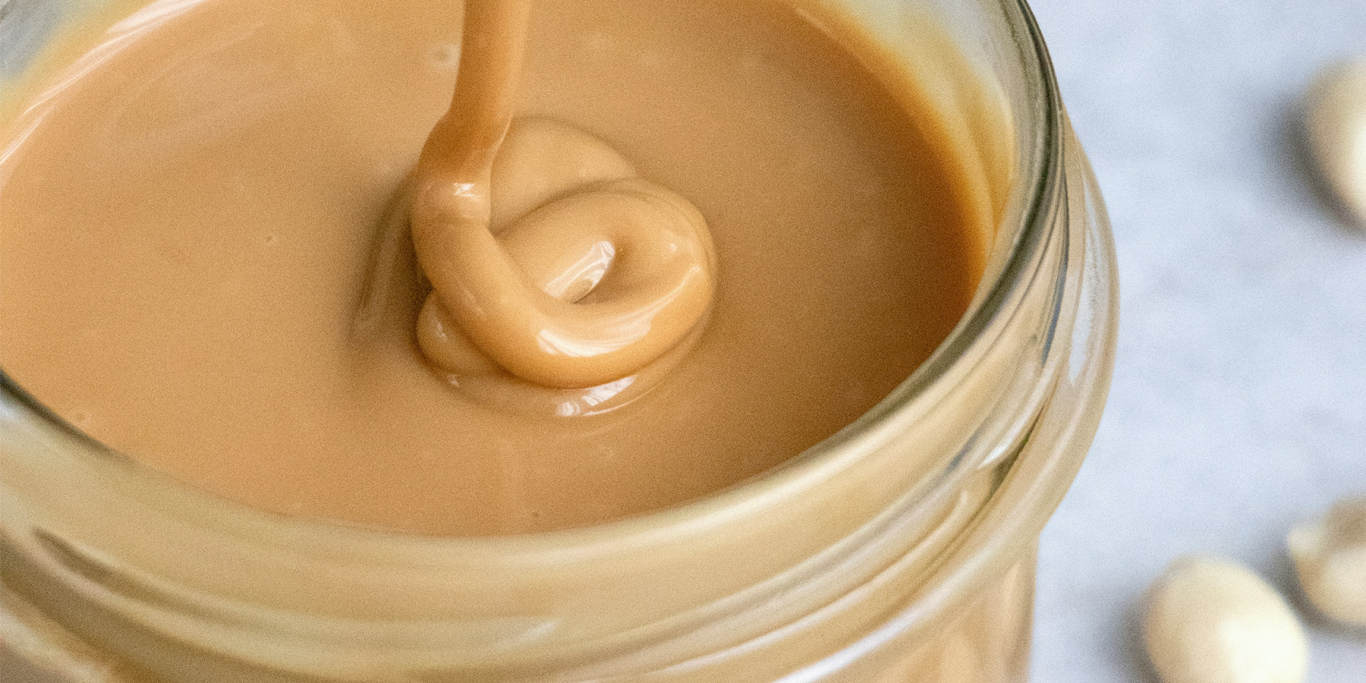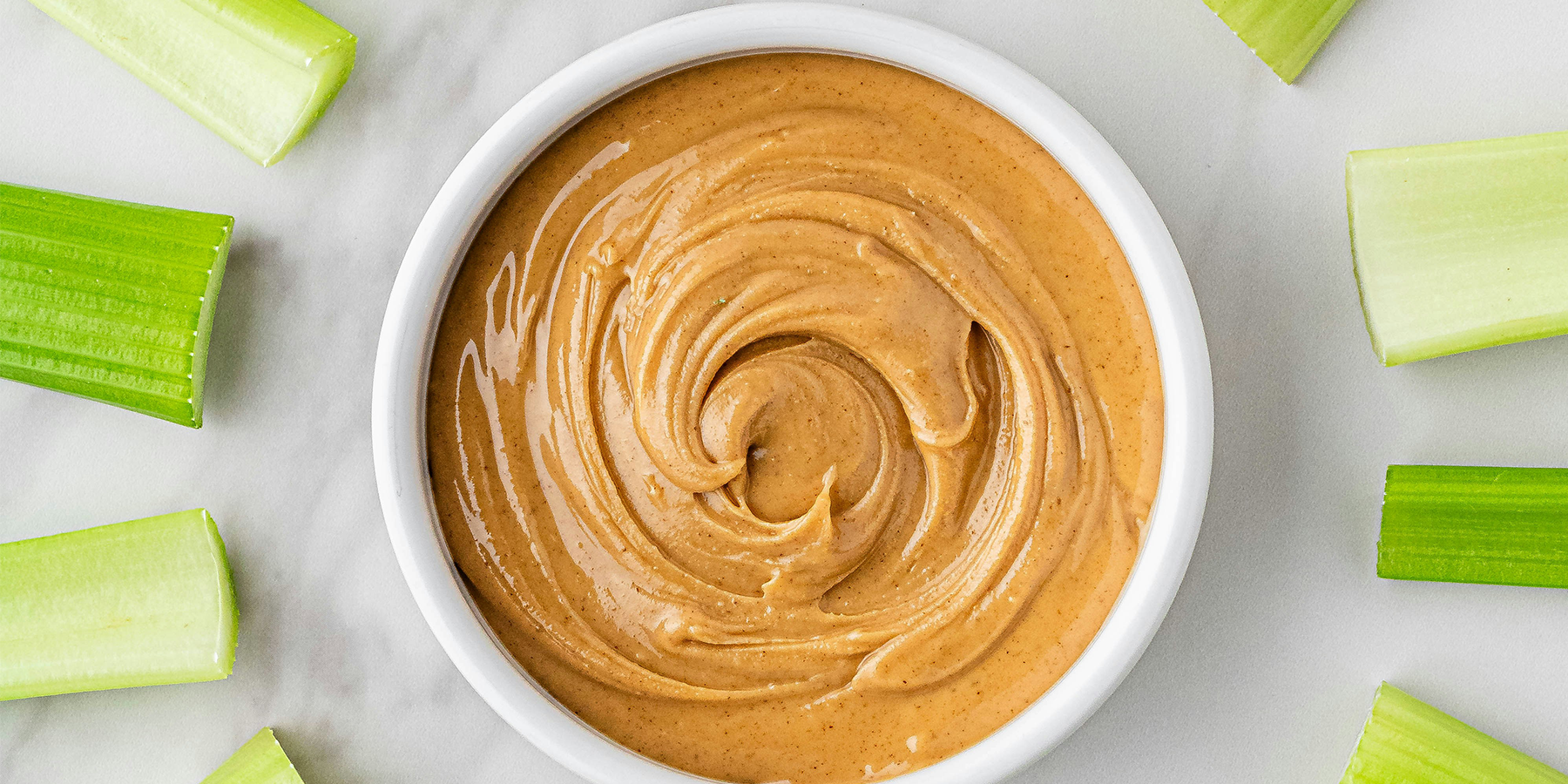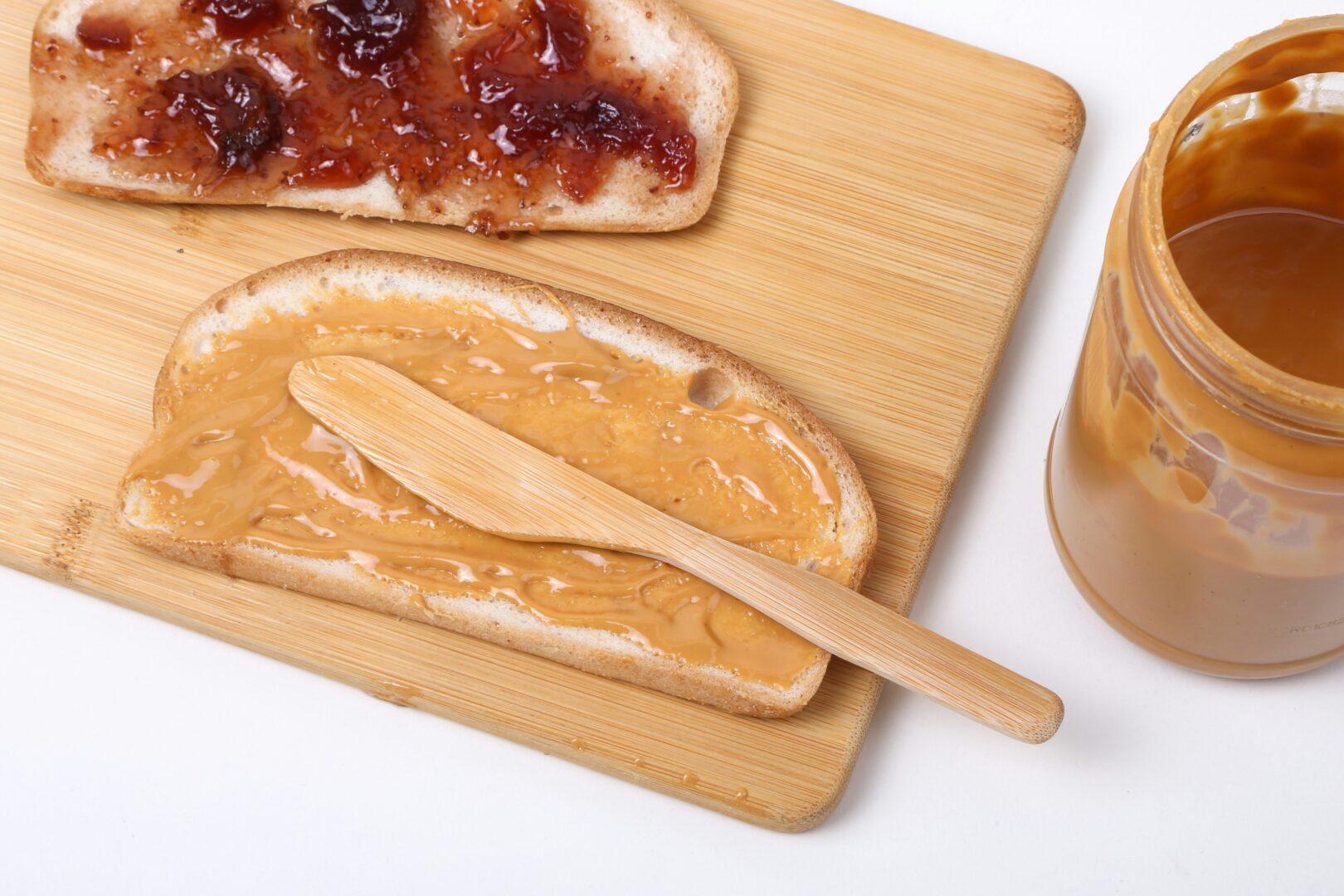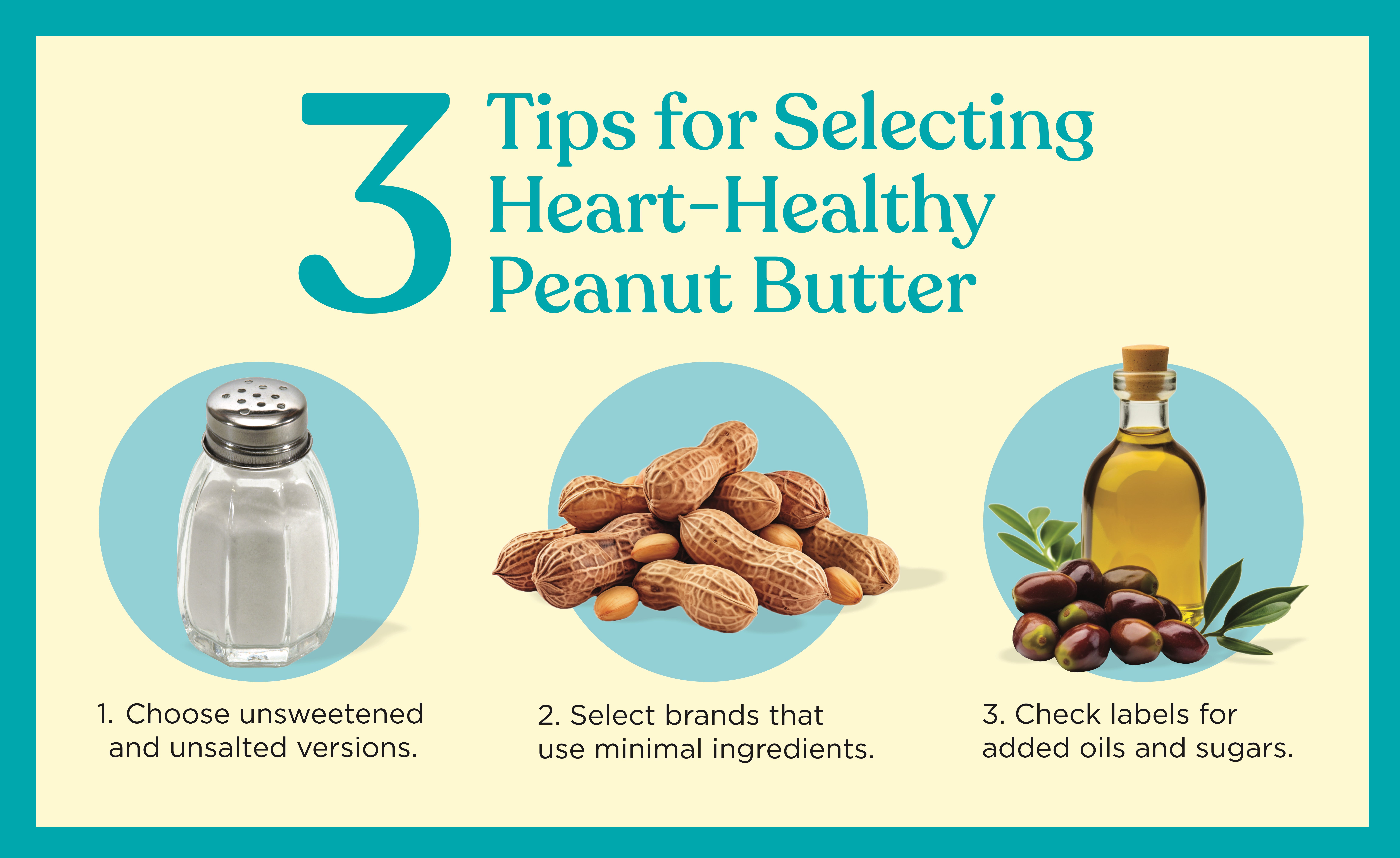Is peanut butter good for your cholesterol?
Peanut butter has long been a popular choice for those seeking a nutritious and satisfying snack. If you're like many of us, you can't get enough of that creamy, nutty goodness. But for individuals conscious about their cholesterol levels, you might be wondering: is peanut butter good for you? Let's dive into the delightful world of peanut butter and see how it fits into a heart-healthy diet when done with moderation.

Is Peanut Butter Good for You?
How well do you know the levels of saturated fats in foods? Test your knowledge with our Healthy Heart Habits quiz!
Peanut butter is a beloved staple in many kitchens and for good reason. It’s tasty, versatile and packed with nutrients. It’s a common ingredient in many households and offers a convenient source of protein and healthy fats. A standard serving of peanut butter (about two tablespoons) contains:
- Calories: 188
- Protein: 8 grams
- Total Fat: 16 grams
- Saturated Fat: 3 grams
- Monounsaturated Fat: 8 grams
- Polyunsaturated Fat: 4 grams
- Carbohydrates: 6 grams
- Fibre: 2 grams
Understanding the nutritional components of peanut butter is essential, especially its fat content, which plays a significant role in cholesterol management. Peanut butter also provides a healthy dose of vitamins and minerals like vitamin E, magnesium, potassium, and B vitamins, making it a nutritious addition to your diet.
Is peanut butter bad for cholesterol?
People often wonder – is peanut butter high in fat? The key to heart health is managing your cholesterol levels, and the types of fats you eat play a significant role. Good news: peanut butter is rich in unsaturated fats, which can positively impact cholesterol levels. But let’s break it down further.
Peanut Butter Contains Two Types of Unsaturated Fat
Peanut butter is rich in unsaturated fats, which are beneficial for heart health. There are two main types of unsaturated fats found in peanut butter:
- Polyunsaturated Fat
- Monounsaturated Fat
Both types of fats can help reduce bad cholesterol levels (LDL) in your blood, which can lower your risk of heart disease and stroke. They also provide essential fatty acids that your body needs.
Polyunsaturated Fats
Polyunsaturated fats are essential fats, meaning the body cannot make them, so they must come from the diet. These fats include omega-3 and omega-6 fatty acids, which play a crucial role in brain function and cell growth. Consuming foods rich in polyunsaturated fats can help lower LDL cholesterol levels and reduce the risk of cardiovascular diseases.
Monounsaturated Fats
Monounsaturated fats are known for their ability to improve blood cholesterol levels, which can decrease your risk of heart disease. They are also beneficial for insulin levels and blood sugar control, making them a healthy choice for individuals with diabetes.
For more detailed information on cholesterol management via diet, check out the Portfolio Diet – Lower Cholesterol Naturally.

Photo by Maryam Sicard on Unsplash
Nutritional Profile of Peanut Butter: Friend or Foe?
The macro and micronutrient content of peanut butter makes it a nutrient-dense food. Here’s a closer look:
Macro and Micronutrient Content of Peanut Butter
- Macro Nutrients: Peanut butter is a good source of protein, which is crucial for muscle repair and growth. The fats in peanut butter, primarily unsaturated, help to maintain healthy blood cholesterol levels and hormone production amongst other things. Peanut butter also contains fibre which is good for heart health.
- Micro Nutrients: It contains vitamins and minerals such as vitamin E, magnesium, and potassium, which are essential for various bodily functions.
Caloric Content and Serving Sizes
Peanut butter is calorie-dense, so portion control is key. Stick to a serving size of two tablespoons to avoid overindulgence.
Balancing Peanut Butter Intake with Other Dietary Fats
Balancing your intake of peanut butter with other sources of dietary fats ensures you get a wide range of nutrients. Incorporate other nut butters, seeds, and healthy oils into your diet to diversify your fat intake.

Photo by Giorgio Trovato on Unsplash
The Role of Peanut Butter in a Heart-Healthy Diet
Peanut butter can be a versatile ingredient in your diet. Here are some tips:
How Peanut Butter Can Help
Peanut butter’s rich content of unsaturated fats, protein, and essential nutrients makes it beneficial for those managing their cholesterol levels. Opt for natural and organic peanut butter without added sugars or hydrogenated fats.
Tips for Selecting Heart-Healthy Peanut Butter
Choose one which has a high percentage of peanuts in the ingredients, without added additives, oils, sugar, or lots of salt.
Incorporating Peanut Butter into a Balanced Diet
- Breakfast: Spread it on whole-grain toast or add a dollop to your morning smoothie for a protein boost.
- Snacks: Pair it with apple slices or celery sticks for a satisfying and nutritious snack.
- Meals: Use it as a base for sauces or dressings, adding a rich and nutty flavour to your dishes.
- Desserts: Incorporate it into baked goods, such as cookies and brownies, or use it as a topping for oatmeal or yoghurt.
For more information on managing cholesterol, visit About Cholesterol.

Peanut Butter and Benecol Smoothie
Ingredients:
- 1 banana, peeled and cut into chunks
- 2 tablespoons of peanut butter (preferably natural or organic)
- 1 cup of almond milk (or any plant-based milk of choice)
- 1 bottle of Benecol yoghurt drink (available in various flavours)
- 1 tablespoon of chia seeds
- 1 teaspoon of honey (optional)
- 1/2 cup of ice (optional, for a chilled smoothie)
Instructions:
- Place all ingredients into a blender, If you prefer a chilled smoothie add ice at this stage.
- Blend until smooth and creamy, this should take 1-2 minutes.
- Taste and adjust. Add more honey for sweetness if necessary, if the smoothie is too thick add a little water and blend again.
Conclusion & Common Misconceptions about Peanut Butter and Cholesterol
Peanut butter can be part of a heart-healthy diet when consumed in moderation. Its rich content of unsaturated fats, protein, and essential nutrients makes it a beneficial food for those managing their cholesterol levels.
Despite common misconceptions, peanut butter does not contain cholesterol as it is plant-based. In fact, the unsaturated fats in peanut butter can help lower LDL cholesterol levels. Incorporating peanut butter into your diet can provide numerous health benefits. However, it’s important to choose the right type and consume it in moderation.
Always consult with healthcare providers for personalised dietary advice, especially if you have specific health concerns or conditions.
Additional Resources
For more information on managing cholesterol through diet, visit these resources:
- Benecol – Portfolio Diet – Lower Cholesterol Naturally
- Benecol – About Cholesterol
- Healthline – Peanut Butter: Is It a Pro or Con When It Comes to Cholesterol?
- Medical News Today – Is peanut butter healthy or unhealthy?
- UK Open Food Facts – Nut Butters
By following these guidelines, you can make informed decisions about including peanut butter in your diet and maintain healthy cholesterol levels.
